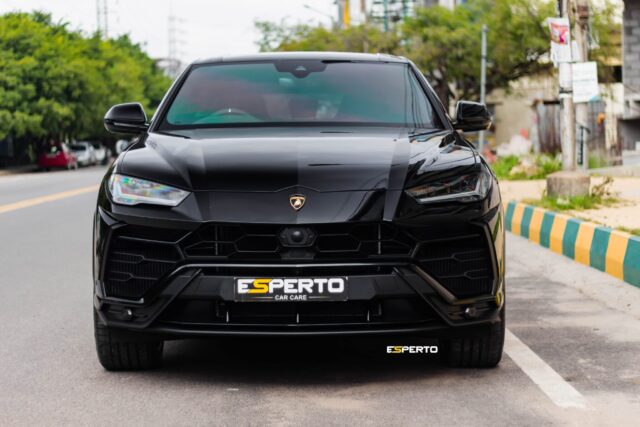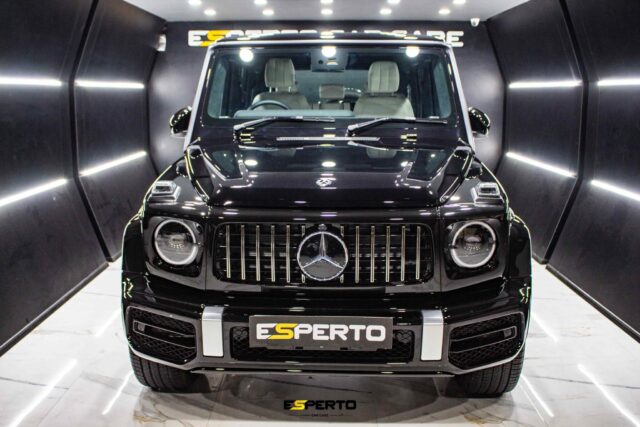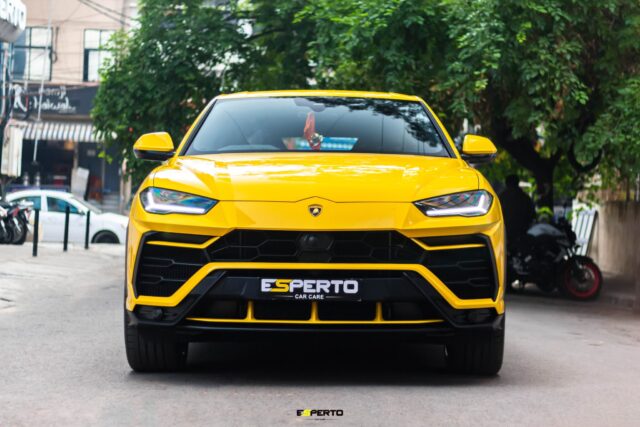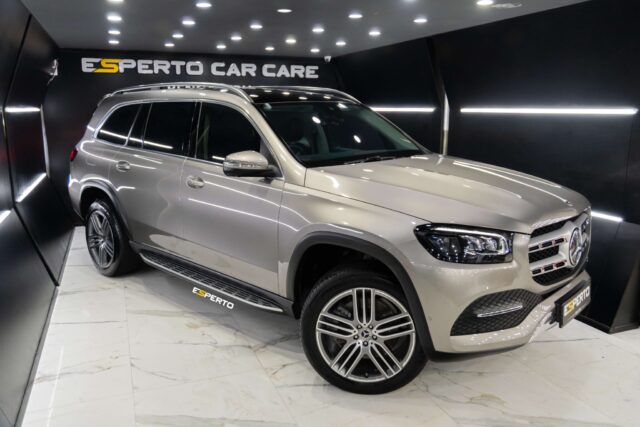Can Car Wraps Protect Against Rust? Benefits and Insights
Many car owners worry about rust damaging their cars over time. Rust can ruin a vehicle’s look and lower its value. A common question people have is, “Do car wraps prevent rust?” Car wraps provide both style and protection; they offer an additional layer of security for your used vehicle, with rust everywhere.
Car wraps act as a barrier against moisture and sunlight, both of which can cause rust and fade paint jobs. This article explores how vinyl wrap protects your ride from these elements and scratches, too.
Please keep reading to learn how to keep your car looking its best.
How Does a Car Wrap Protect Against Rust?
A car wrap acts as a strong barrier against rust by keeping the surface of your vehicle safe from water, dirt, and other contaminants. These elements cause oxidation if they come into direct contact with your or paint a rusty car’s metal parts.
Wrapping: wrapping a rusty car or car in vinyl ensures that moisture does not accumulate underneath the surface. This is crucial in preventing rust since humidity is one of the main factors that leads to oxidation and corrosion.
Vinyl wraps also add an extra layer of protection by sealing off any minor scratches or dents on your vehicle’s body. Scratches expose the metal underneath to air and moisture, speeding up the rusting process.
By covering these imperfections, vinyl wraps maintain the integrity of your car’s exterior, reducing the chances of rust significantly. With proper installation and maintenance, wrapped vehicles enjoy a level of protection that keeps their surface looking its best while safeguarding it against corrosive damage.
Understanding the Role of a Wrap in Rust Prevention
Car wraps play a crucial role in rust prevention by acting as a moisture barrier for your vehicle. These vinyl car wraps cover the entire surface, shielding it from water, salt, and other elements that can lead to rust.
The vinyl material is waterproof, preventing moisture from making direct contact with the metal parts of your car or truck. This makes wrapped vehicles less likely to develop rust spots over time.
A properly applied vehicle wrap acts like a shield against environmental threats, keeping the car’s exterior in top-notch condition.
Vinyl wraps also offer protection against minor scratches and abrasions that can expose metal surfaces to air and moisture. By keeping these hazards at bay, the wrap maintains the integrity of your vehicle’s surface.
With regular maintenance and care for rust-free vehicle wraps, owners ensure their wrapped cars remain resistant to corrosion.
Can a Vinyl Wrap Prevent Moisture Buildup Underneath?
Moving from understanding how wraps aid in rust prevention, we now explore the effectiveness of vinyl wraps in combating moisture buildup. Moisture under a car wrap can lead to various issues, like oxidation and corrosion, undermining the vehicle’s integrity and appearance.
Vinyl wraps act as a shield that helps keep water away from the car’s surface. Yet, for this protection to be effective, proper installation is crucial.
Vinyl wraps come with adhesive backs that adhere tightly to the paint surfaces when applied correctly. This close adherence leaves little room for moisture to sneak in underneath. However, gaps or bubbles resulting from improper installation can trap moisture, which might eventually cause rust or peel off the wrap itself. That’s why air bubble removal during installation is crucial to maintaining the integrity and effectiveness of the wrap.
Thus, choosing professional installers who ensure that your car remains rust-free becomes essential. Proper care and maintenance also play vital roles in preventing moisture accumulation by keeping wrapped areas clean and intact over time.
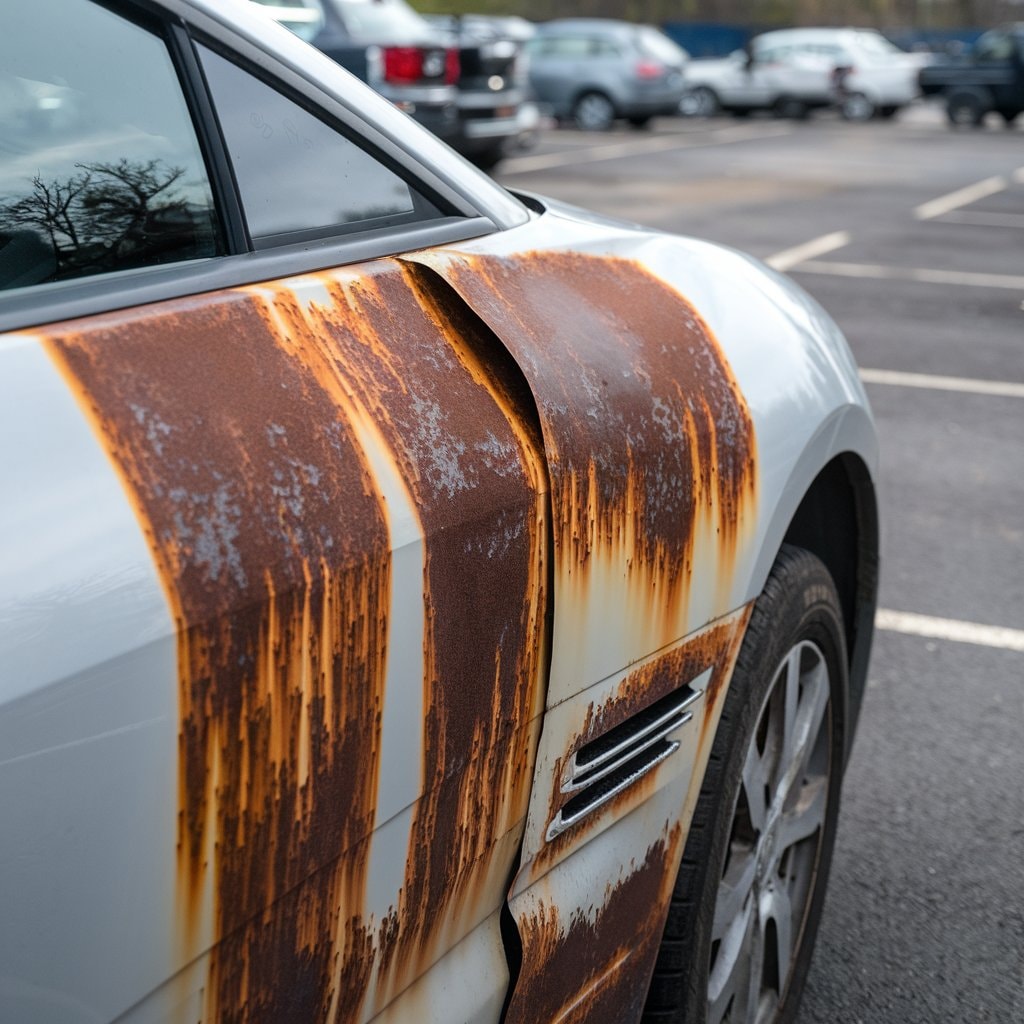
Why Wrapping a Car Might Reduce the Chances of Rust
Transitioning from the topic of moisture, let’s address car wrapping to prevent rust and prevention. A car wrap serves a protective function for your vehicle. This protection keeps rust-causing elements away.
Factors such as water, dirt, and road salt cannot penetrate the paint or metal body of your car when it is wrapped. The vinyl fabric used in wraps prevents these materials from directly touching your vehicle’s surface.
Wraps prove particularly useful in regions susceptible to harsh weather or heavy road salt use during winter seasons. They isolate areas where moisture could gather and initiate the rusting process.
This results in a reduced likelihood of developing rust for rust to develop under the wrap.
Are Wrapped Vehicles Scratch-Resistant?
Vinyl car wraps add a layer of defense against everyday wear, including scratches and abrasions. This protective film acts like a shield for the car’s surface, saving it from minor scrapes that happen in parking lots or from road debris.
The durability of vinyl wraps means they withstand direct contact with water, sunlight, and even chemicals much better than paint alone. Owners often notice their vehicles keep looking new longer due to this scratch resistance.
A wrapped car doesn’t just carry visual appeal; it brings practical benefits in scratch prevention.
Car enthusiasts find peace of mind knowing the wrap guards against UV rays and severe weather, too. Scratch-resistant properties in these wraps add value by preserving the vehicle’s aesthetics without constant touch-ups or repairs.
Proper maintenance ensures the vinyl remains effective at protecting against exterior threats, keeping cars looking their best while on the road.
How Vinyl Car Wraps Protect Against Scratches
Car wraps act like a shield for your vehicle’s exterior. They provide an extra layer of protection against everyday wear and tear. This means that minor scratches and scuffs that would typically reach the paint will first have to get through the durable vinyl wrap.
This protective vinyl film is particularly effective at keeping those common abrasions at bay, ensuring the car maintains its pristine look longer than unprotected vehicles.
The material used in car wraps boasts scratch-resistance properties. For instance, if a bike brushes against the side of a wrapped car or truck, the chances of it leaving a mark are significantly reduced compared to bare paint.
Some advanced vinyl wraps even come with self-healing qualities where light scratches can disappear under heat from the sun’s rays or a hot water soak. This extraordinary feature helps keep your vehicle looking its best without constant touch-ups or repaints, contributing to preserving your car’s aesthetic value over time.
The Scratch Resistance of a Wrapped Car
A vinyl wrap creates an extra shield for your vehicle to the car’s exterior, safeguarding it from scratches and minor abrasions. This feature is crucial for maintaining a vehicle’s aesthetic value over time.
These wraps are designed with durability in mind, providing an effective shield against everyday wear and tear. They resist damage from common hazards like bird droppings, tiny stones on roads, and even light impacts that could otherwise leave marks on the paintwork.
The scratch resistance of car wraps also means owners spend less on cosmetic repairs. With this protective barrier, vehicles can withstand various elements that they encounter daily without showing signs of wear as quickly as unwrapped counterparts might.
This resilience extends the wrap’s lifespan and ensures the car continues to look its best with minimal maintenance required beyond regular washes with soapy water to keep it clean and shining. A rust resistant primer can further enhance the protection by creating a base layer that resists corrosion, ensuring both the wrap and the underlying paint are better protected from rust.
What is the Impact of a Car Wrap on Paint?
A car wrap acts like a shield for your vehicle’s paint. It protects the surface from everyday wear and sun damage, helping to keep the paint job looking newer for longer. This protective layer can prevent minor scratches and abrasions that typically occur from road debris, maintaining the vehicle’s aesthetic appeal.
Wrapping your car can substantially extend the life of your paintwork.
Car wraps adhere directly to the paint, creating a barrier against moisture, dirt, and UV rays. With proper installation and maintenance, they will not damage underlying paint surfaces.
In fact, wraps offer extra protection from dents and environmental factors that cause rust and corrosion. Keeping your car wrapped ensures its exterior stays in top condition while also preserving its value by protecting against elements that lead to rusting underneath the wrap.
Does a Wrap Protect the Paint Job?
Car wraps serve as a protective shield for your vehicle’s paint job. They guard against various environmental threats, including sun damage, minor abrasions, and contamination from bird droppings or tree sap.
This layer of protection helps maintain the car’s aesthetic appeal and can even enhance its resale value by supporting the underlying paint in flawless shape. If your vehicle has some early signs of rust, prep paint a rusty surface before applying the wrap to ensure a smooth and lasting finish.
Wrapping your car acts like a barrier that prevents direct contact with harmful elements. It also makes cleaning easier since most dirt and grime will not stick to the vinyl surface as much as they do to paint. For cars with existing rust, it’s essential to paint a rusty car first and address any imperfections to avoid further rust damage under the wrap.
With proper maintenance, this means less wear and tear on the actual paint surface over time, contributing to preserving your vehicle’s look for years to come.
Can Car Wraps Cause Damage to Paint?
Turning our focus from how wraps protect paint, it’s crucial to examine if they can also be a source of harm. Vinyl wraps need proper installation to avoid damage to the vehicle’s surface.
If misapplied, the adhesive used in vinyl wraps might leave residue or even peel off the original paint when removed, painting a rusty car. This risk is higher if the car’s existing paint job has chips or is already peeling.
To prevent such issues, ensuring that professionals do the wrap application is key. They prepare your car properly before wrapping up the surface by cleaning and repairing any imperfections before applying the wrap. This step keeps your car’s paint safe under the vinyl layer.
Maintenance plays a role, too; regular checks can spot problems early on, preventing lasting damage from vinyl adhesion issues or trapped moisture leading to rust underneath.
How Vinyl Wraps Adhere to Paint Surfaces
Vinyl wraps adhere to paint surfaces through a combination of pressure and Heat. The process starts with cleaning the vehicle’s surface Carefully to get rid of all dirt, grease, or debris.
This ensures that the vinyl wrap can stick properly without anything getting in the way. Then, installers apply the vinyl wrap carefully onto the car’s exterior. They use squeegees to smooth out bubbles and wrinkles for a seamless and smooth finish throughout.
A good car wrap looks like it’s painted on.
The adhesion is strong because modern vinyl wraps are designed with special adhesives that bond firmly yet allow for removal without damaging paint jobs. These adhesives respond well to temperature changes, meaning they’ll hold tight whether it’s hot or cold outside but can be gently lifted when it’s time for a change or removal.
This technology allows car owners to protect their vehicle’s surface and give it a new look simultaneously while making sure the original paint stays intact beneath.
How to Ensure Your Wrapped Vehicle Stays Rust-Free
Ensuring your wrapped vehicle remains rust-free is crucial for maintaining its aesthetic and structural integrity. Proper care and maintenance significantly increase the lifespan of both the wrap and the rusted vehicle.
- Opt for professional installation to guarantee that the wrap adheres correctly to all areas of your vehicle, preventing moisture from seeping underneath.
- Use a car wash specially designed for wrapped vehicles. This prevents abrasive materials from damaging the wrap and causing scratches where rust could form.
- Frequently check your vehicle for any signs of wear or damage. Minor issues, if left unnoticed, can become more significant problems, potentially allowing rust to form. By catching these early, you can avoid rusting despite owners taking preventive measures.
- Refrain from leaving your car parked in direct sunlight for too long. UV rays can degrade the wrap, making it less effective against rust and corrosion.
- Apply a ceramic coating over your wrap. This extra layer adds protection against water, dirt, and other elements that might cause rust.
- Keep your car dry and clean. Moisture is a primary factor in rust formation, so ensuring your vehicle is dry will help protect the surface.
- Immediately repair any dents or damages to the wrap. A compromised wrap exposes the paint underneath, potentially putting your car at risk for rust. Consider using acid rust-removing fluid for smaller patches of rust before reapplying vinyl to treat those areas.
- Follow vinyl wrap cleaning tips from professionals to maintain its protective qualities without causing harm to its surface.
- Perform preventative maintenance on wraps by reapplying sections that show extensive wear or have been on the vehicle beyond their Wrap lifespan.
- Educate yourself on Rust prevention FAQs to tackle common concerns and implement best practices for caring for your wrapped vehicle, including how to treat smaller rust patches or apply an acid rust treatment to prevent further damage.
Adhering to these guidelines ensures that your car stays looking sharp while minimizing risks associated with rust formation under wraps, ultimately protecting your investment in both the wrapping and the vehicle itself.
Proper Installation Techniques for Vinyl Wraps
Installing vinyl wraps correctly is crucial for ensuring your car remains rust-free and looks excellent. Professionals start by thoroughly cleaning the vehicle’s surface. They remove any dirt, grime, and oils that could prevent the wrap from adhering correctly.
The cleaner the surface, the better the wrap will stick to your car.
Next, experts carefully apply the vinyl wrap, smoothing out bubbles and wrinkles as they go. This step requires precision because any imperfections can trap moisture, leading to rust under the wrap.
Technicians use specialized tools to ensure a snug fit around the curves and edges of the entire vehicle. Proper installation guarantees not just protection against rust but also adds a layer of impact resistance and maintains paint job preservation for years.
Maintenance Tips to Keep Your Car Rust-Free
Keeping your car rust-free requires regular maintenance and care. Washing your vehicle every two weeks helps remove dirt and road salt that can cause corrosion. Pay special attention to the undercarriage during cleaning, as this area is most prone to rust.
Dry your car thoroughly after washing since water trapped in crevices aids rust formation.
Applying a high-quality wax every six months will provide an additional barrier against moisture and environmental contaminants. Make sure to check for signs of wear or damage in the vinyl wrap, as these could expose the underlying paint to risk.
Act quickly to resolve any problems you come across to maintain the vehicle wrap’s integrity and keep your car looking great while preventing rust.
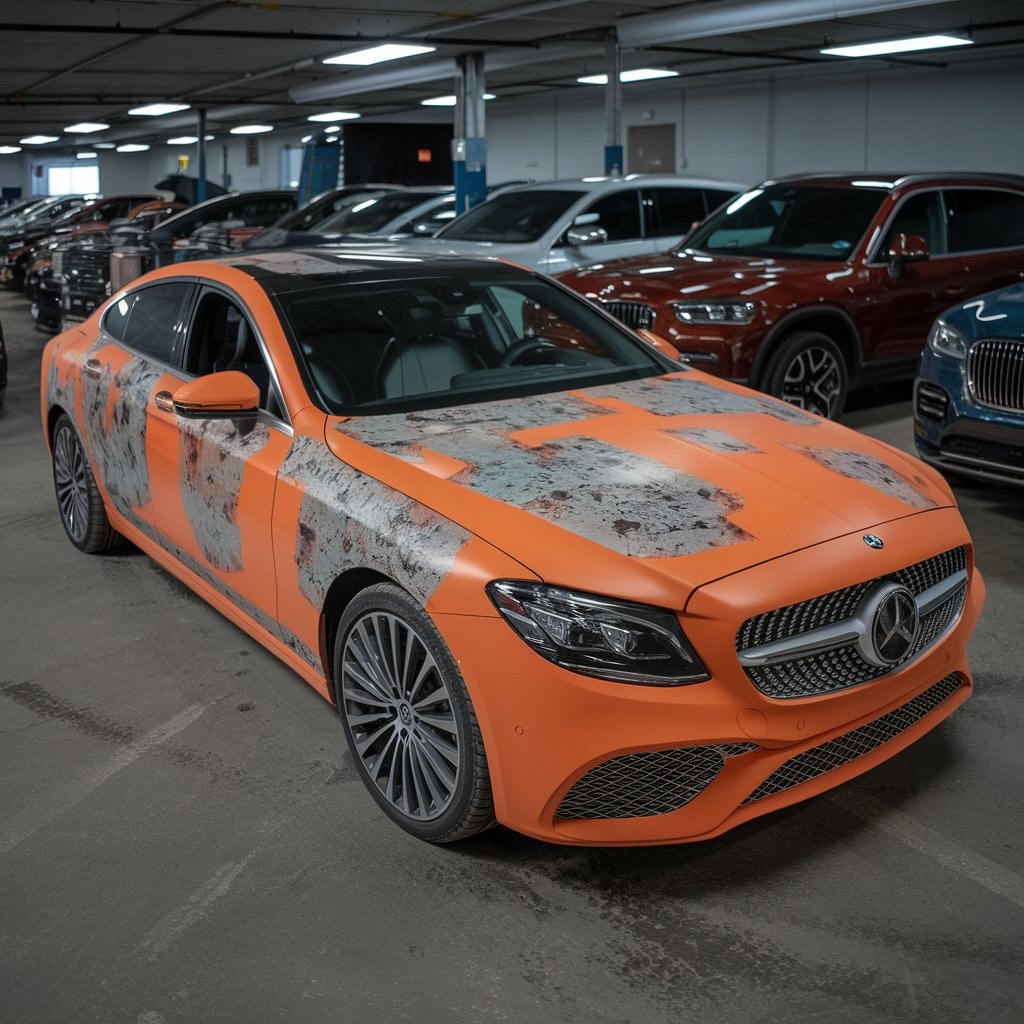
The Role of Ceramic Coating in Protecting Wrapped Cars
After exploring maintenance tips to keep your car rust-free, it’s crucial to discuss how ceramic coating plays a significant role in protecting wrapped cars. The ceramic layer enhances the overall shield of your vehicle on top of the vinyl wrap.
This protective barrier safeguards against various environmental threats like water, dirt, and sunlight that can cause damage over time.
Ceramic coatings enhance the durability of car wraps by making them more resistant to scratches and abrasions. They also prevent oxidation, ensuring that the vehicle remains rust-proof under its stylish exterior.
This extra shield helps maintain the car’s aesthetic appeal while also preserving the integrity of both the vinyl wrap and the original paint underneath. By applying the ceramic coating, owners ensure their wrapped vehicles gain an added level of defense against everyday wear and tear, keeping them looking newer for longer.
FAQ About Car Wraps and Rust Prevention
Car wraps offer more than just a new look for your vehicle. They also play a significant role in preventing rust and protecting the paint.
- Vinyl Wraps Provide Moisture Protection: Vinyl acts as a barrier against moisture, which is the primary cause of rust on vehicles. By keeping water away from the metal surface, car wraps reduce the risk of rust formation.
- Rust Prevention Layer: A well-installed vinyl wrap acts like a shield, preventing oxidation by limiting the metal’s exposure to oxygen and water, two critical elements needed for rust to develop. If you find any rust spots before applying a wrap, it’s essential to apply bare metal cellulose to treat those areas before wrapping.
- Prevents Oxidation: Since rust is essentially the oxidation of metal, wrapping your car can significantly slow down this process by offering an additional layer that blocks air and moisture. Before wrapping a rusty vehicle, use a bare metal cellulose stopper on any exposed metal to ensure the wrap adheres properly without trapping moisture underneath.
- Scratch-resistant Coating: Vinyl wraps are designed with scratch resistance in mind. Minor scratches that would typically reach the paint and expose metal will only affect the wrap, leaving the vehicle unharmed.
- Impact of Car Wrap on Paint: A common concern is whether wraps damage paint. In reality, they protect it from UV rays, minor abrasions, and contaminants that can lead to fading or chipping.
- Car Wrap Damage Myths: Some believe that removing vinyl can damage paint. However, if applied and removed correctly, it should not harm your vehicle’s paint job.
- Wrap Durability for Cars: Most vinyl wraps Can endure for 5 to 7 years, influenced by factors like quality of installation and exposure to harsh weather conditions.
- Proper Wrap Care: Maintaining your wrapped vehicle involves regular washing to prevent dirt buildup and avoiding harsh chemicals that might degrade the vinyl material.
- Preventative Rust Care for Wrapped Cars: Keeping your car wrapped reduces direct contact with corrosive elements, but inspecting edges for lifting or water intrusion ensures long-term protection.
- Ceramic Coating on Wrapped Vehicles: Applying ceramic coating over vinyl wrap adds an extra layer of protection against watermarks, staining, and UV rays while making cleaning easier.
- FAQ: Are Car Wraps Worth It for Rust Prevention? Investing in a high-quality car wrap is indeed worthwhile for those looking to guard their vehicles against rust while offering an aesthetic change.
Common Concerns Regarding Wrapped Vehicles and Rust
Many car owners worry that vinyl wrapping on their vehicles might trap moisture, leading to rust. This concern is valid since water trapped under the vinyl wrap for a long time can harm the car’s surface.
Yet, high-quality wraps are designed to be waterproof and allow for proper ventilation. This means they prevent moisture accumulation, effectively reducing the risk of rust development.
Another frequent question is about how wrapped vehicles hold up against corrosion resistance over time. Wraps offer a barrier against external elements like water or sunlight that usually cause rust on unprotected cars.
With correct installation and routine maintenance, a wrapped car can stay rust-free longer than an unwrapped one. Keeping your vehicle wrapped in top shape involves regular washing and limiting prolonged exposure to extreme conditions, which helps maintain its protective qualities against abrasions and prevents paint scratches that could lead to rusting.
Understanding the Lifespan of a Car Wrap
Several factors determine the longevity of a car wrap, including how well the vehicle is maintained and the conditions it faces regularly. Generally, high-quality vinyl wraps last between five to seven years.
Keeping car wraps in top shape involves regular cleaning and avoiding prolonged exposure to harsh weather conditions. Vinyl durability plays a crucial role in protecting the vehicle’s exterior and maintaining its appearance over time.
Proper installation techniques for vinyl wraps also significantly impact their longevity. Wraps applied by professionals with attention to detail ensure that there are no bubbles or wrinkles that could result in early peeling or deterioration.
Vehicle wrap upkeep, such as using gentle washing methods and parking in shaded areas, can extend a wrap’s life beyond its expected lifespan, ensuring rust-free care and sustained paint protection.
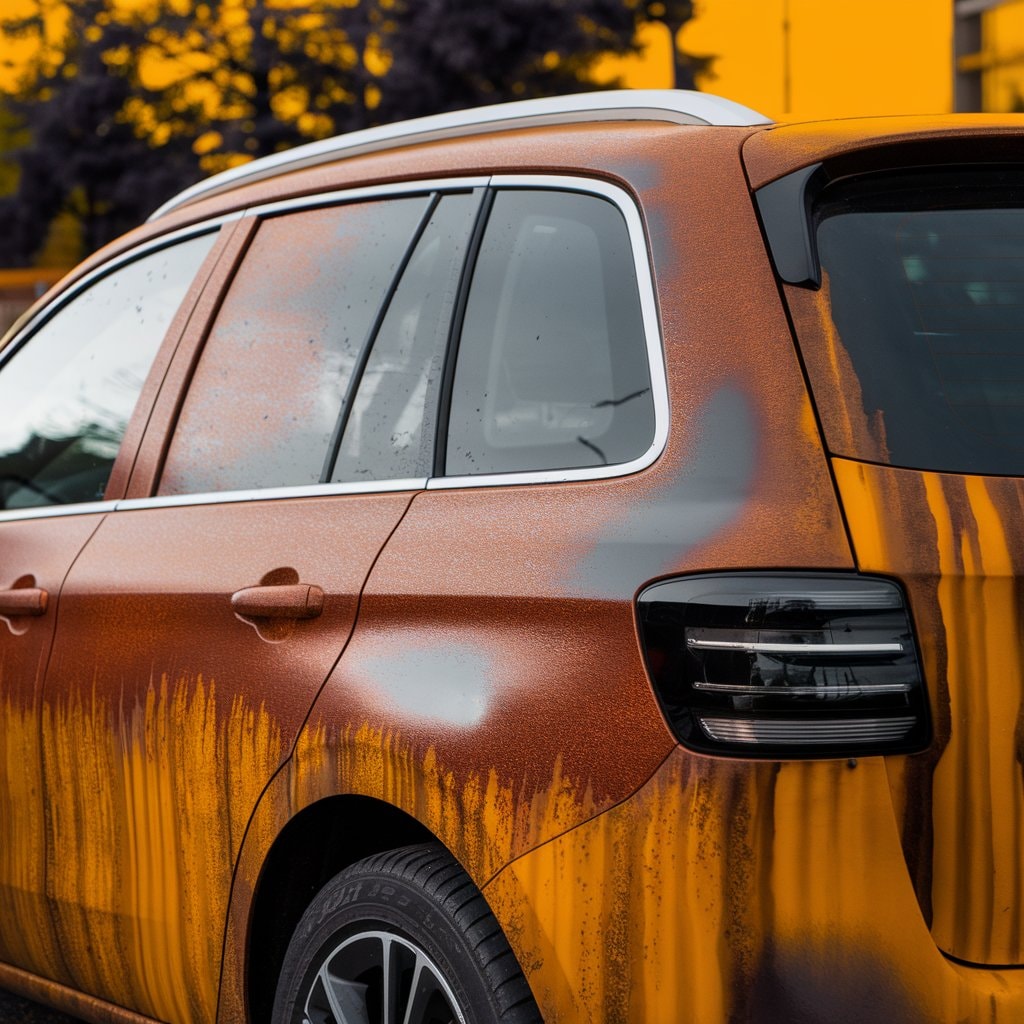
Are Car Wraps Worth the Investment for Rust Prevention?
Choosing to equip your vehicle with car wraps can be a sensible decision for preventing rust. Car wraps serve as a guard, shielding your vehicle from moisture and lessening the direct interaction with water or sunlight.
These elements are essential as they frequently cause rust to form on cars. A vehicle with a wrap doesn’t just have a visual advantage; it benefits from an extra level of protection against corrosion.
Auto enthusiasts and owners searching for rust-resistant wraps will discover that this investment proves worthwhile over time. The endurance of a vinyl wrap means less concern about scratches and environmental harm that could lead to expensive fixes otherwise.
Retaining a wrap on your vehicle is a proactive measure in preserving its worth and making sure it stays rust-free even in demanding conditions.
Conclusion
Car wraps provide significant protection from environmental factors, encapsulating your vehicle in a safeguard that thwarts rust and scratches. With suitable upkeep and care, well car owners maintain this commitment, preserving your car’s exterior and improving its lifespan.
Wrapping your car is a forward-thinking move that will make your vehicle withstand corrosion and abrasion. Deciding knowledgeably on vinyl wrap for corrosion resistance can profoundly affect your vehicle’s health, maintaining its fresh and new appearance longer than anticipated, as long as the same level of attention is paid to its maintenance.
This decision mirrors the understanding of maintaining your prized car or bike in optimal condition, devoid of typical water damage and everyday wear.



